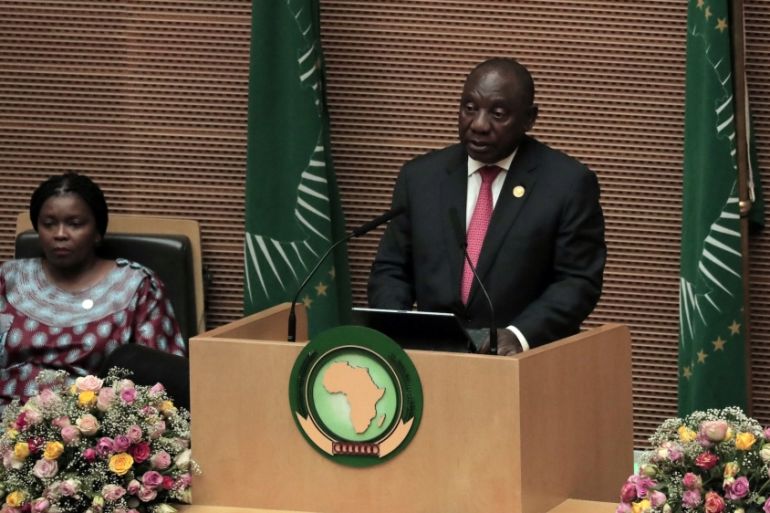South Africa is not ready to lead Africa
South Africa’s tendency to disregard repression in its backyard has left it ineffective at promoting democracy.

On February 9, South Africa’s President Cyril Ramaphosa assumed the presidency of the African Union (AU) at a summit held in Addis Ababa, Ethiopia. There he made mention of a “new epoch of governance and leadership in Africa”, and vowed that “South Africa will play its part to deepen the review processes, and upscale the implementation of actions needed to improve governance” through the African Peer Review Mechanism (APRM).
However, this magnificent projection of political intent rang very hollow. A decade and a half ago, South Africa would have eased into the role of big brother, secure in the strides it had taken to promote human rights, democracy and good governance within its borders and beyond. Then, South Africa stood head and shoulders above the rest of Africa. It exuded a seemingly impregnable impression of relatively clean governance, strong economic growth and an exemplary, progressive human rights culture.
Keep reading
list of 4 itemsIt is time for a new Africa beyond borders and boundaries
Addis summit raises questions about AU’s muted stance on Ethiopia rifts
It is high time the AU takes a firm stance against Ethiopia’s aggressions
However, present-day South Africa stands in stark contrast to this promising past. The southern African nation is blighted by endemic corruption at state-owned establishments, poor service delivery, high unemployment and xenophobic violence towards mainly African and Asian migrants and refugees. South Africa is increasingly displaying many of the characteristically post-independence failures that have crippled development across Africa.
The tacit moral leadership and diplomatic momentum South Africa enjoyed in the late 1990s and early 2000s have dissipated, possibly irretrievably. Its failures at home seem to hold significant sway over its cautious and underwhelming role in promoting democracy in Africa. Its tendency to engage in quiet, unproductive diplomacy and disregard repression by leading former liberation movements, especially in its backyard, the Southern African Democratic Union (SADC) region, has left it appearing aloof and practically ineffective at promoting democracy.
South Africa largely remained silent when Zambia’s President Edgar Lungu’s administration cracked down on dissent and harassed and repeatedly jailed opposition leader Hakainde Hichilema. Last year South Africa hailed President Peter Mutharika’s re-election in Malawi’s disputed May 2019 presidential election, a poll recently invalidated by a constitutional court ruling. And its sorely required interventions in trouble-hit Zimbabwe have hardly inspired change.
South Africa’s latest shot at helping to resolve a crisis that has destroyed a once-promising economy and sent millions into exile, compromised holding a one-day symposium on Zimbabwe last November in Pretoria. There South Africa’s International Relations and Cooperation minister Naledi Pandor simply regurgitated SADC’s standard mantra on EU/US sanctions, and suggested that a solution to Zimbabwe’s myriad problems lay with engaging the US and EU.
She also stressed that South Africa does not “have the solution to Zimbabwe’s woes” and veered clear of merely mentioning or unequivocally condemning Zimbabwe’s dismal human rights record and an ongoing disagreement over a still fiercely disputed presidential election.
It is a fairly weak, detached and retrogressive position, albeit one that is predictably consistent with South Africa’s regularly mute responses to governance-related electoral crises and gross human rights abuses in places such as Tanzania, Egypt and the Democratic Republic of Congo.
At this feeble and inadequate rate, how will South Africa affect the development of democracy in Africa? The much-touted APRM, a voluntary scheme, is at best likely to serve as a handy PR tool for despotic governments. The many politically unstable African countries hardly require sophisticated analysis to understand how broadly undemocratic they are and why. And they do not deserve to be sheltered by a sweeping veil of legitimacy from Africa’s most developed nation.
A more insightful understanding of South Africa’s views on African democracy, human rights and good governance on the continent is reflected in a recently enacted law on refugees. Home Affairs Minister Aaron Motsoaledi gazetted the Refugees Amendment Act on January 1. Among many changes, the law bans refugees from participating in politics involving their home countries.
Amid criticism of the decision to restrict the political liberties of refugees from troubled African nations, Motsoaledi claimed: “Countries that have been democratically elected … you might not like them, you might not like their economy, their principles, but the fact is that they were democratically elected in an election that was supervised and passed by international organisations.”
Motsoaledi’s defective, blanket assessment of democracy, buttressed by a dubious, impractical yardstick for electoral credibility, should certainly be music to the ears of Egypt’s President Abdel Fattah el-Sisi, Teodoro Obiang Nguema Mbasogo of Equatorial Guinea, Congo’s Denis Sassou Nguesso and President Emmerson Mnangagwa of Zimbabwe. Yet, a spate of disputed sham electoral outcomes in Africa should be a cause for substantial concern, not unfettered legitimacy.
It is pretty naive and plainly futile to believe that APRM will trigger the improved governance Africa needs. Egypt, for example, launched its APRM mission in December 2019, just months after a repressive crackdown on anti-government demonstrations and the death of Egypt’s first democratically-elected president Mohamed Morsi in a Cairo prison.
Yet South Africa has mostly ignored Sisi’s brutal rule and Morsi’s controversial death. Instead, it has chosen to cash in on the “strong historical and fraternal bonds dating back to the era of the liberation struggle” it shares with Egypt.
South Africa should be a willing, active and unwavering advocate for good governance. Indeed, why should it have a credible democratic standard for South Africa, and practically none for Africa? How will the AU’s agreed political and economic goals be met, if Africa’s flagship democracy finds comfort in helping to provide despots with diplomatic cover? Until South Africa redefines its diplomatic priorities, it will not be ready to lead Africa.
The views expressed in this article are the author’s own and do not necessarily reflect Al Jazeera’s editorial stance.
